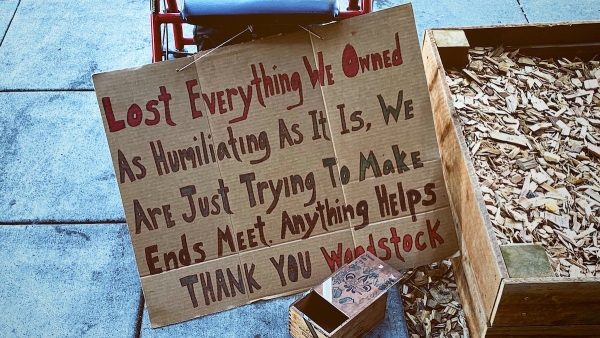The Sorrow In Which God Resides

Sermon for September 6, 2020
The Rev. Matthew David Morris
Jesus pledges to be with his followers. I’m not sure if they’re ready for what that means. I’m not sure we are either.
This week, as your priest, and on behalf of this community, I asked 4 neighbors who are currently experiencing poverty and houselessness to pack up their belongings and find a different place to rest.
Whatever you bind on earth will be bound in heaven, Jesus tells us, and I watched as they bound up their tents and their plastic bags and loaded them into shopping carts.
The soft grass of our little corner of heaven could not support them any longer. The hard sidewalk near Bi-Mart would have to do.
I feel like you need to know this because I did this, in part, for you. And even though that seems to be what some of you wanted, I can’t shake the feeling that I sinned against God in the process.
Did I break the commandments that Paul reminds us of today in Romans? Did I commit adultery? Did I murder? Did I steal? Did I covet?
No.
But did I love my neighbor as myself? Love does no wrong to a neighbor, St. Paul says. Therefore, love is the fulfilling of the law.
Did I break the law of love? And did I do it on your behalf? Maybe.
I do know that I totally took the easy way out.
You see, we received an email this past Sunday from a man––a housed neighbor––which expressed his frustration over the presence of tents in his otherwise “family-friendly” neighborhood, and he encouraged All Saints to be “good neighbors” and ask these people to move along.
So, I took the easy way out and explained to these four people sleeping on our lawn that the reason they would need to move their tents was that the neighbors were beginning to complain, and the next thing that they may do is call the police, and I didn’t want them to have to deal with that kind of confrontation.
I framed it as though I was doing them a favor, even while I implicitly told them that they are not our real neighbors: the people with houses are.
Steve, one of the people I displaced, told me as I was driving a load of his things in the back of my car that, “We were sure we would be safe at a church.”
I wanted to say something to make him feel better, but I couldn’t. I’d already taken the easy way out.
By making some disgruntled neighbor the reason Steve wasn’t welcome to rest here on church grounds, I managed to avoid having to explain how it is that some of us at All Saints––a community that takes pride in the work it’s doing on the weekends to offer services to people experiencing poverty and houselessness––some of us simply didn’t want him here.
Maybe there are rational reasons for not wanting Steve or Amanda or Yvonne to rest here on the property. Concerns about drug use. Fear of building damage. Nervousness about what the housed neighbors will think.
But I didn’t go into that with Steve. I just said, “it was a neighbor.”
Jesus says, “Where two or three are gathered in my name, I am there among them.” The easy way out, when it comes to this saying of Jesus, is to spiritualize Jesus as a kind of godly guardian angel who is summoned every time the priest prays at the start of a meeting, and then politely dismissed every time the priest prays at the end of a meeting.
The harder way to hear these words is to consider that when two or three are gathered as Christians––as members of Christ’s body, as members of All Saints––that Jesus is here, among us, in a tent, on the lawn.
The Word became flesh and pitched a tent among us. That’s the actual meaning in Greek. Not dwelt among us. Pitched a tent.
What if Jesus is here among us, not when have scheduled time for him to be at the building, but whenever he is tired, and hungry, and thirsty.
“Do you give away water in your food boxes?” Steve asked me when I saw him midweek in front of New Seasons. “Amanda and I split a bottle of water last night,” he said. It had been in the 90’s that day.
I told him I wasn’t sure, and that I was sorry to tell him that All Saints has put locks on its faucets to keep people from stealing the brass.
You’re telling this to Jesus, I kept thinking.
I remembered the moment when, driving by All Saints a few years ago, I saw that you had decided to erect a metal fence around the green where people had been sleeping in their tents.
The feeling that I felt when I saw All Saints’ gated lawn, and when I asked Steve and his fellows to move along, and when I told him about the locked water faucets, was a hard feeling to name, at first. Was it anger? Was it frustration? Was it shame? Shame comes closest, but shame makes it about me. This feeling was evoked by the situation.
The feeling was sorrow.
I felt sorrow when I first saw the fence. I felt sorrow when I asked them to move. I felt sorrow when I learned about the brass.
Shame is the easy way out, when it comes to this situation. Shame is a luxury of the privileged. Shame redirects the conversation to the discomfort that guilt puts on a person’s conscience, and in doing so keeps their from having to name their complicity; to name their role in perpetuating sin.
Shame also motivates the question, “What can I do to fix this?” That question, like shame, lets us bypass the sorrow that comes from acknowledging the truth.
Shame is a fence we build to keep the truth out.
Shame is isolating. Sorrow is much harder to sustain.
And yet, we are Christians. We profess that God’s sorrow moved God to step out from God’s heaven to be with us; to sorrow alongside us; to pitch a tent among us.
Sorrow is God’s gift that is given when we look at the truth and do not look away.
In the moment of fully accepting the truth, we step into the sorrow in which God resides.
The fear to be with the sorrow keeps us from being with Jesus. The fear justifies the easy way out.
When I took the easy way out, I did it to avoid my feelings of guilt and to spare the community any shame. But in doing that I also sidestepped the sorrow on your behalf: your sorrow; sorrow in which you are called to meet God.
So, I’m sorry I did that. I’m sorry I tried to spare you from the truth about the world and the truth about this community.
I hope this looses you from your shame and encourages you to be with your sorrow, just as I am attempting to be with mine. You may find, as I have, that Jesus is there, in the sorrow, looking for a place to lay his head.
Love him as you love your neighbor. And love your neighbor as you love him.
Amen.
Tags: Sermons
